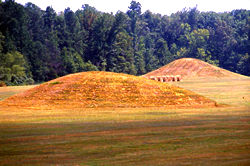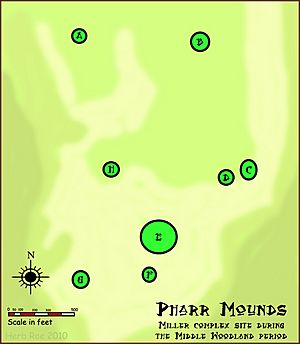Pharr Mounds facts for kids
Quick facts for kids |
|
|
Pharr Mounds
|
|

Two mounds at the Pharr Mounds site
|
|
| Nearest city | Tupelo, Mississippi |
|---|---|
| NRHP reference No. | 78000346 |
| Added to NRHP | February 23, 1978 |
Pharr Mounds is an important archaeological site located near Tupelo in northern Mississippi. It's a collection of large earth mounds built by ancient people. These mounds were created during the Middle Woodland period, a time between 1 and 200 CE (Common Era).
The site has eight dome-shaped mounds. They were used as burial mounds by people of the Miller culture. This culture was part of the larger Hopewell tradition. Pharr Mounds is considered one of the biggest and most important sites from this ancient time. It was added to the National Register of Historic Places in 1978.
What are the Pharr Mounds?
The Pharr Mounds site is found near the start of the Tombigbee River. This area has hills and many swampy streams. The site is named after "Pharr Flats," a flat area overlooking two creeks.
There are eight dome-shaped mounds at the site. They are all different sizes. Over time, some have become flatter due to farming. The mounds cover a large area of about 90 acres.
Mound Sizes
Here's a look at the different sizes of the mounds at Pharr Mounds:
| Mound | Width and length | Height |
|---|---|---|
| Mound A | 55 feet (17 m) by 65 feet (20 m) | 7 feet (2.1 m) |
| Mound B | 105 feet (32 m) by 110 feet (34 m) | 18 feet (5.5 m) |
| Mound C | 115 feet (35 m) in diameter | 18 feet (5.5 m) |
| Mound D | 80 feet (24 m) by 95 feet (29 m) | 12 feet (3.7 m) |
| Mound E | 165 feet (50 m) by 175 feet (53 m) | 8 feet (2.4 m) |
| Mound F | 60 feet (18 m) in diameter | 8 feet (2.4 m) |
| Mound G | 200 feet (61 m) in diameter | 6 feet (1.8 m) |
| Mound H | 110 feet (34 m) by 130 feet (40 m) | 2 feet (0.61 m) |
Discoveries at the Mounds
In 1966, an archaeologist named Charles F. Bohannon led a team to dig at four of the mounds. They found interesting things at the bottom of the mounds. These included fire pits and low platforms made of clay.
They also found human remains, some of which had been cremated. Many special objects were found too. These objects were used in ceremonies.
Ancient Trade Networks
Many of the items found were made from materials not found locally. These included copper from the Great Lakes area. Other materials were greenstone, galena, and mica. This shows that the ancient people traded with others far away. This trade was part of the larger Hopewell exchange system.
The artifacts found include copper ear-spools and a greenstone pipe. These items prove that the local people were connected to a much wider world during the Middle Woodland period. Their trade routes reached all the way to the Great Lakes.
 | Laphonza Butler |
 | Daisy Bates |
 | Elizabeth Piper Ensley |




